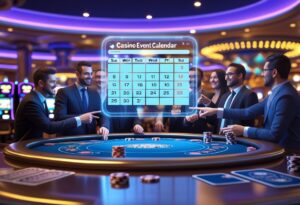
The Psychology Behind Casino Design: How Murk and Ember Manipulate Your Senses
Control Environment for Newfangled Measures
Murk and Ember Casino has an atmosphere of sophisticated artistry that effortlessly combines environmental psychology with design principles drawn from major around the world tourist attractions. By playing with the senses it controls this establishment subtly determines how a guest feels in its world. In doing so people are made to believe they choose what they get at every step even while their steps are being engineered for them.
The casino’s signature dim illumination serves several psychological ends at once. Allowing patrons to see the burgundy silver and turquoise decor scheme yet rendering the color pale and abstract in shadows low intensity lighting of this kind creates intimate spaces that encourage people to stay longer. It avoids time cues like clock or watch hands as well as references for place in space so that the individual actually feels rootless and grounded nowhere. Strategic ambient design goes hand in glove with acoustic engineering to create an environment where traditional computation mode gets electronically blurred.
Captive Audience and Cash Flow

By designing the casino in a way that reflects man’s natural environment the effect enhances human senses making it feel refined and tasteful to the touch even as it may subtly change their content.
Of Advanced Behaviorism
The house edge silently covertly operates beneath mathematically calculable odds on
- Control systems regulating its atmosphere to produce optimal levels of excitement
- An artificial lighting strategy that distupts natural circadian rhythms in order enable the establishment to operate 24 hours a day and yet only show night time in its effect on people
- Tricks which make a person lose track of where they are and how long he has been gambling for
Introduction of Multiple Senses Together
This maze of subtle manipulation operates in the subconscious minds of those gaming. It has the cloak and dagger playfulness of effective persuasion about its influence. Pushing for gambling behavior while maintaining mask as personal choice. These control mechanisms are highly efficient and effective 먹튀검증커뮤니티 온카스터디
The Casino Lighting Effect
Lighting Design in Modern Casinos
When someone enters onto a casino floor the environment designed by skilled lighting engineers is already up to very large extent shaping his gaming experience.
Standard casino lighting techniques turn each gaming section into a self contained environment hewn out of the urban jungle. This is at best inclusive local area design or intelligence environment.
In its wisdom the casino architect decided to make walls golden and provided warm lighting. Using the disposition of the various devices that help man open doors in order to form an intimate atmosphere it is a place where exclusiveness and accessibility merge into one how underground Arc & Lash betting
The high powered local lighting under these lines will give the player a strong peripheral edge effect or halo while keeping them in darkness and unconsciously partitioning them. A particular feature of standalone units is that there are relatively few chairs grouped.
In addition different seatings have their own dedicated lights or spotlights to enhance the activity at each site. In this way all the pressure is put on bar wedding lamps leaving room for decisive winners.
Visual Stimulus Control
Low intensity ambient lighting enhances visibility and reduces eye fatigue. Strategic spotlighting increases the importance of brighter gambling areas. In addition to creating excitement in the casino winner’s area it also influences visitor’s spirit and duration of stay there.
Differences between gambling zones and passageways as well as between gambling spaces and wall patterns guide the movement of people in a casino. Illumination for each task produces better gambling experiences at the table.
Designing Time
Way Design Elements That Alter Time Perception
Today’s casinos employ a host of advanced environmental design techniques that cater to behavior management and the perception of time.
Three basic design principles harmonize for immersive environments that are highly conducive to persistent gaming.
No Clocks
By removing clocks from sight on the gaming floor casinos deprive players of a reference for time. This isolation from the outer world greatly reduces one’s ability to follow how long he has been playing and leads to extended gaming sessions.
Light Control and Its Relationship to Time
A windowless or heavily bronzed system that intentionally keeps out all sunlight has several advantages
- Disrupts natural rhythms
- No clock cues are apparent in the environment
- Lighting is consistent at all times
- The gambling arena goes uninterrupted
The Loop Without End
The maze like floor plan is perhaps the most sophisticated part of the casino’s psychological design. The key features are curved pathways that wind through gaming zones strategic placement of high traffic facilities such as restrooms and eating courts complex routing to exits and services circular walking paths encouraging game players to see all points they might be interested in playing at along as well as video displays without having moved very much beyond their current position on this path.
Such a precisely engineered combined environment from which players are structurally and temporally insulated is now an effective servomechanism for their leisure activity.
Sound and Smell Strategy in Casino Gaming
Sensory Filters in Architecture
A carefully timed combination of sound and scent in the environment can increase the effectiveness of your gaming floor while influencing how people perceive their time to be passing.
Audio Engineering and Gamesmanship in Casinos
Casino soundscapes have been designed to create an immersive environment with a carefully woven tapestry of auditory elements
- Slot machine chimes
- Sounds of winnings
- Ambient background music
Different game areas carry different musical intensities.
Modern Casinos Scent Strategy
Precisely chosen fragrances are delivered around the building through advanced ventilation systems
- Vanilla notes for warmth
- Lavender scents for calm and relaxation
- Citrus odours or tastes to further stimulate awareness
This combination of scent and audio design in casinos creates a multi sensory environment where
- The perception of time is manipulated
- Gaming becomes more interesting
- Players are more involved
- Environmental conditions encourage long playing sessions
Architectural Strategy for Spending in Gambling Locations
Engineered Navigation and Pathway Design
A long and meandering approach route takes players past many opportunities to gamble. Lack of straight lines helps avoid becoming disengaged. This integrated approach provides one enticement for every four steps.
Strategic Pathway Component
- Curved walkways encourage movement and disorient time awareness
- Visitors walk further on the casino floor
- Sense of direction and time is disrupted
Limited Exit
Strategic exit placement and visual barriers keep departures out of sight. Exit uncertainty increases continued engagement.
Destination-Based Layout Strategy
Core gaming zones like slot machine area or blackjack tables are located in the center. Establishments surround them. These zones serve as anchor points channeling people through profit sectors.
Effects of Architectural Psychology
By integrating design elements into a single package it creates a space that seems alive and welcoming. Casinos use this method to
- Optimize traffic circulation
- Increase gaming opportunities
- Generate customer goodwill
Social Engineering at Gaming Tables
Understanding Player Dynamics
Casino staff employ psychological techniques to provide high level gaming experiences.
Strategic Player Involvement
Casino professionals identify behavior patterns and tailor their approach to each table. High rollers get recognition while new players are reassured and supported.
Casino Ambiance and Sensory Stimulation
Sound plays a key role. Chip stacking and clicking noises create sensory stimulation. Visual and tactile cues promote bonding among players.
Movements of cards and shared emotions create a communal experience.
With these refined techniques dealers orchestrate immersive atmospheres that make simple games into engaging social experiences.





